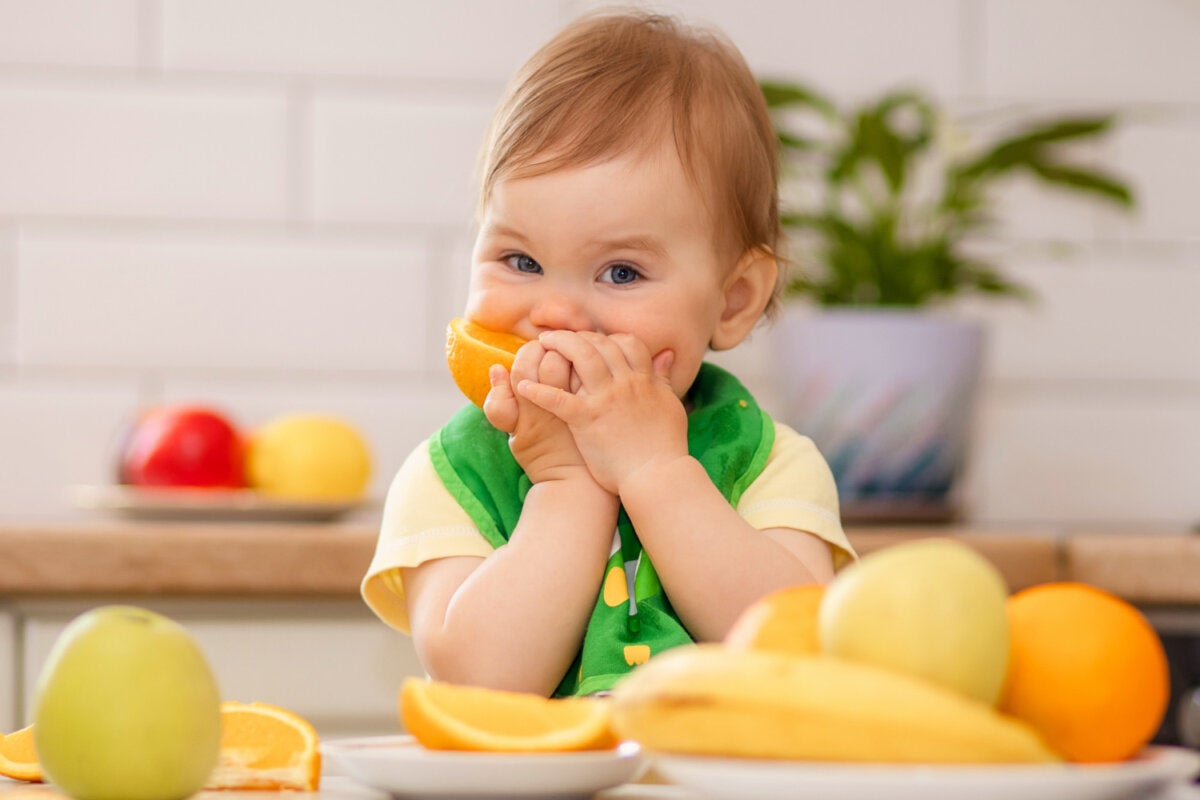When Can Babies Start Eating Citrus Fruits?
Knowing at what age and in what way babies can consume citrus fruits will allow you to offer these nutritious fruits in a safe way.

Introducing new foods to your child allows them to explore flavors and textures as they learn to eat. Because of their acidity and pulpy consistency, mothers often wonder when babies can start eating citrus fruits.
Taste and health benefits come together in these juice-packed fruits. We’ll tell you the ideal time to introduce them to your little one’s diet as well as some strategies to offer them safely.
The most common citrus fruits and their benefits
Citrus fruits are a group of fruits that are characterized by their sour or sweet and sour flavor, juiciness, color, and intense aroma. Because they’re sweeter, mandarins, tangerines, and oranges are the most common in baby food.
Lemon, lime, and grapefruit are also part of this group, although, with some exceptions, they’re not generally liked by children.
These fruits are characterized by being an important source of vitamin C in the diet of children. This micronutrient strengthens the immune system, favors healing, intervenes in the formation of collagen, bones, and teeth, and improves the absorption of iron from food. Its presence in the early stages of life is essential.
Consuming citrus fruits also provides other important nutrients, such as potassium, magnesium, folic acid, and beta-carotene. Its high water content helps the baby to stay hydrated and the fiber improves intestinal transit and fights constipation.
When to introduce citrus fruits to a baby’s diet
According to a systematic review published in the Revista Española de Nutrición Humana y Dietetica, babies can start consuming citrus fruits from the age of 6 months, coinciding with the start of complementary feeding. It’s important to favor a diverse diet that includes the different food groups from the beginning.
In general, experts suggest exposing children constantly and frequently to these foods once they start eating solid foods. If you have any doubts, you can talk to your child’s pediatrician before starting to offer your baby oranges and tangerines.
What if my baby eats citrus fruits before the age of one?
For a long time, experts recommended waiting until 12 months of age to offer citrus fruits to babies. But, as we mentioned above, there’s no evidence to postpone their consumption until one year of life.
Citrus fruits aren’t usually linked to allergic reactions, so there’s no reason to delay their introduction. Currently, pediatricians suggest offering a variety of foods before the first birthday to avoid late food allergies.
The acidic content of these fruits was one of the reasons for delaying their consumption in young children. Irritation or redness around the mouth or diaper area may be reactions associated with citrus intake. However, these aren’t usually problems that become complicated.
Heartburn can also cause stomach upset or aggravate the symptoms of acid reflux in infants with acid reflux. In these cases, it’ll be up to your pediatrician to evaluate and determine the right time for your child to start eating citrus fruits.
The risk of choking is another reason why some pediatricians prefer babies start consuming citrus after 12 months of age. But with enough supervision and care, they can eat them and reap the benefits of fruits before their first birthday.
Discover these: 9 Foods that Should Be in Your Child's Diet
How can citrus fruits be safely offered to babies?
It’s important to introduce citrus fruits gradually and watch for any reactions they cause in your baby. If you notice rashes, irritation, or stomach upset, consult your pediatrician before continuing. If your child develops hives, swelling, vomiting, or difficulty breathing, seek medical attention immediately.
Here are some tips to help you incorporate these fruits into your child’s diet:
- Wash the peel of the fruit thoroughly before consumption.
- Choose one citrus fruit at a time, such as tangerines, mandarines, or oranges.
- Always stay with your baby while they’re eating.
- Depending on your child’s age, cut the fruit into wedges or small pieces.
- Be sure to remove the skin, membranes covering the segments, and seeds to avoid choking hazards.
- The first few times you give citrus fruits to your baby, do it in the morning before 3 pm. You’ll have all day to observe possible reactions.
- Don’t overdo the amount of citrus you give your baby. A wedge or two or three teaspoons a day can be a good starting point. However, we want to remind you that complementary feeding should be varied, introducing a new food every day or every two or three days, according to the latest Consensus on complementary feeding from the Latin American Society for Pediatric Gastroenterology, Hepatology and Nutrition: COCO 2023).
- Once your child is familiar with mandarins, tangerines, and oranges, you can gradually introduce other citrus fruits, such as grapefruit, lemons, and limes, to diversify your baby’s diet.
- If they don’t like oranges at first, don’t force them to eat them. Let a few weeks go by and offer them again. It may take a little more time to get used to the particular taste of citrus fruits.
- Be especially careful if your baby is teething or has mouth sores. If so, avoid offering citrus fruits during these days, as the acid may cause discomfort, and your child will resist eating these fruits afterward.
How to cut citrus fruits according to your baby’s age?
Each baby has its own developmental rhythm. You and your pediatrician will determine the safest way to offer food to your child. However, here are some suggestions on how to cut or prepare citrus fruits according to your baby’s age.
- 6 to 8 months of age: Wash the orange peel very well and cut it into large segments. Leave the peel on, but remove all the seeds and membranes. Let your baby hold the fruit and suck and chew on the pulp to explore this food. Be sure to supervise them at all times.
- 9 to 17 months: At this stage, your little one will have developed a pincer grasp and can take advantage of it to grab small pieces of oranges or tangerines and put them in their mouth. Cut pieces of fruit about the size of your fingertip, without membrane or seeds about the size of your fingertip.
- From 18 months: If you trust your child’s ability to chew and swallow, gradually consider offering larger pieces of fruit with the membrane intact.
Is it okay to give squeezed orange juice to my baby?
Although it may seem easier to offer citrus in juices or smoothies, it’s not ideal. The American Academy of Pediatrics points out that juice shouldn’t be introduced into the diet of babies before 12 months of age.
Specialists say that it’s preferable to eat citrus fruits in segments or chunks to take advantage of their nutrients and ingest the fiber they contain. This component helps babies’ intestinal transit.
In addition, eating the pieces of fruit allows your child to manipulate their own food, feel the texture, get to know the food, and, little by little, learn to eat and chew on their own. Consuming citrus pieces also helps your little one feel fuller and regulate the amount of fruit he needs on their own, without overdoing it.
Keep in mind that two to three pieces of fruit are used to prepare a glass of juice, which is a very large amount for a baby. In addition, many commercial juices contain added sugars and aren’t recommended for a small child.
[/atomik-read-too]
Cases in which babies shouldn’t consume citrus fruits
In general, citrus fruits are safe foods for most babies. However, it’s essential to be aware of certain circumstances that may require a consultation with your pediatrician before introducing or continuing them in your child’s diet.
If there’s a family history of allergies, especially to citrus or other foods, it’s best to be cautious. This doesn’t imply that these fruits should be avoided completely, but it’s important to seek guidance from a health professional.
It’s also advisable to consult your pediatrician if your little ones experience gastrointestinal problems, such as gastroesophageal reflux in infants. The acidity of these fruits can worsen the symptoms of this problem.
Finally, if your baby has a specific allergic reaction to these fruits, you should avoid offering them to your child in the future. In addition, you’ll have to be careful with products that contain citrus derivatives among their ingredients.
Eat citrus fruits with your baby
When babies start consuming citrus fruits, it’s important to take into account their age, their individual circumstances, and the way the fruit is served. In addition, it’s important to consider that when little ones learn to eat, they watch and imitate you.
Sit next to your baby and enjoy the taste and properties of oranges and tangerines. This way, you’ll be teaching and motivating them to prefer these natural and beneficial products. Consuming these acidic fruits can be a positive and healthy experience that you can share with your child.

